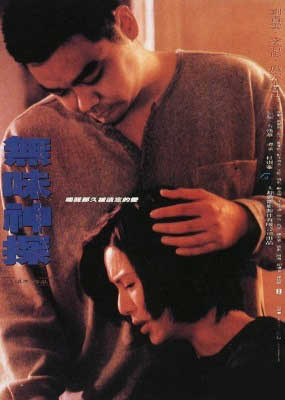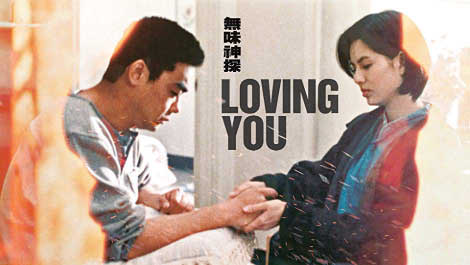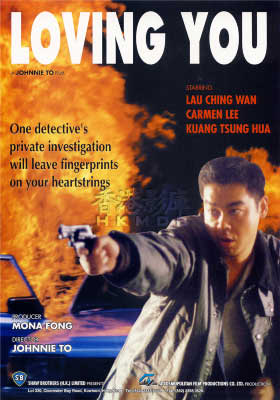

Much has been written about Hong Kong's commercial nature and how most Hong Kong movies are meant to primarily entertain (rather than educate or whatever else that films can do). It is thus interesting to come across the following statement on a particular favorite work by the man who probably is best known in the West for being co-director, along with Ching Siu-Tung, of the superheroine action fest that is "The Heroic Trio":- "I didn't have to think about the market when I made LOVING YOU, because the budget for the film was only 6 million HK dollars and after making a number of films, I knew that I would, no doubt, earn back the money for the investor. Since I didn't have to think about the audience reaction, I could make the film the way I want and talk about what I like to talk about. LOVING YOU is one of the films I like most..." (Johnnie To, in Miles Wood's "Cine East", 1998:125).
Since its main character is a tough -- to the
point of callousness -- plain-clothes police inspector who cares more about
his job than his home-life and wife, one might expect this Johnnie To directed
effort to be gritty crime drama. To be sure, there are some spectacularly
choreographed and filmed action scenes along with a despicable and frightening
villain in this work (Both of which are entirely evident in the first few
minutes of this film). However, as with "Lifeline" (another pre-Milkyway
Production helmed by To, produced by Mona Fong and starring Lau Ching Wan
and Carmen Lee), this 1995 offering derives much more emotive force from its
being a moving drama than a standard cop versus killer movie.

Still, anyone who thinks that that whose English title is LOVING YOU is going to be straightforward lovey-dovey melodrama also will be very much mistaken (and shocked by some of the violence that rears its ugly head in this film). Rather, in a similar vein to another Johnnie To production that stars Lau Ching Wan (the stir-causing "Where a Good Man Goes"), the point of the movie seems to be less centered on the heartwarming (seeking of) redemption of a man who is hardly a saint and more about the not necessarily overwhelmingly gratifying gradual realization -- by himself along with others (such his wife and colleagues) -- that he nevertheless is a caring person underneath all the remaining bluster and prickly exterior.
Lest it be thought that I may have just spoiled
the whole movie, let me assure the reader that the beauty and interest of
LOVING YOU is in the details and actions of the characters rather than the
rather simple -- and predictable -- plot. The story's believability,
strength, intensity and impact are very much helped by the layered performance
of Lau Ching Wan and the quiet yet significant presence provided by Carmen
Lee. The moments when the husband and wife they convincingly portray
are in the same physical space and yet are as apt to miscommunicate or not
communicate as to successfully do so often feel as real(-life) as they are
painful to observe. Such is the level of tension that beholding their
awkwardness induces that those times when they actually succeed in sharing
something brought about such incredible relief on the part of this (re)viewer.

This personal and intentionally mundane story does get spiced by episodes involving others in the lives of the two principal characters. Most of these are related to the husband's line of work (One never really gets a good sense of what is the wife's occupation even though she is shown at her workplace in at least one scene). By far the most action-packed involve a drug-dealer nemesis (portrayed by Toh Chung Wah). I think though that the more interesting separately involve two other policemen, both of whose actions serve to comment further about the life-impacting consequences of failures to communicate.
From Johnnie To's words as well as post viewing LOVING YOU, it is quite clear this movie was not made with enjoyment in mind. I have to admit that I also don't share the views of such as Joseph Fierro that it is near flawless (and not necessarily because its choice of background music is seriously one of the worst I have encountered in a Hong Kong movie). Yet, I do think that this surprisingly sensitive offering is worth viewing: Not so much because it makes any profound statements; but, rather, because it truly does appear to be that rare film whose makers endeavored to share with its audience thoughts and feelings that really do come from the heart.
My rating for the film: 8.
